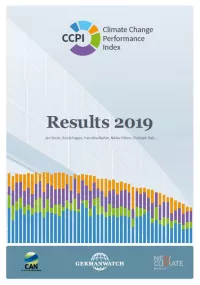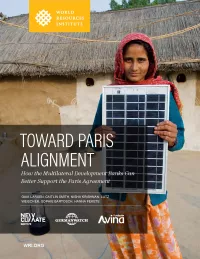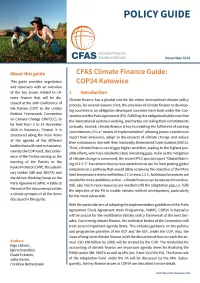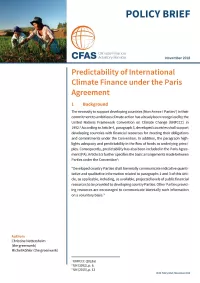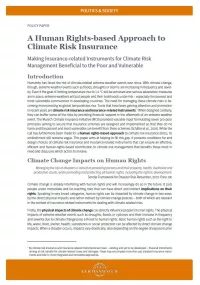
Aktuelles zum Thema
After three consecutive years of stable CO2 emissions, emissions are rising again. The Climate Change Performance Index 2019 (CCPI), published today at COP24 in Katowice, shows only few countries have started to implement strategies to limit global warming well below 2 or even 1.5°C. While there is a continued growth and competitiveness of renewable energy, especially in countries that had low shares before, the CCPI shows a lack of political will of most governments to phase out fossil fuels with the necessary speed. Because of that, in most countries the climate policy evaluation by national experts is significantly lower than in the last years.
The CCPI is an independent monitoring tool of countries' climate protection performance. It aims to enhance transparency in international climate politics and enables the comparability of climate protection efforts and progress made by individual countries. Based on standardised criteria, the index evaluates and compares the climate protection performance of 56 countries and the EU, which are together responsible for more than 90 percent of global greenhouse gas (GHG) emissions.
Multilateral Development Banks (MDBs) can play a critical role in limiting climate change and helping communities adapt to its impacts. Since 2011, they have provided nearly $200 billion in finance for climate change mitigation and adaptation (so-called “climate finance”). The World Bank Group’s recent announcement that it will increase its climate-related investments means this number is likely to grow. But while climate finance is important, it makes up less than a quarter of all finance provided by the MDBs. The rest goes to activities that may (or may not) undermine climate goals.
The world’s climate goals can only be reached with enough high quality financial support. Multilateral development banks (MDBs) have to play a vital role in efforts to shift global finance flows towards a sustainable future.
The report aims to support the ongoing efforts by MDBs to achieve alignment between their activities and the global climate goals and to help shareholders and stakeholders to screen projects and strategies for Paris alignment. It can also serve as a discussion basis for the efforts of other financial institutions to align their financial flows.
Tropical cyclones have heavy impacts on an increasing number of countries. In 2017, the hurricane season in the Caribbean Sea was particularly strong and left several islands destroyed. Furthermore there are some developing countries that have difficulties to recover as they are regularly hit by weather catastrophes. Especially poorer countries like Sri Lanka, Nepal or Vietnam are facing great challenges. All in all, in 2017 11.500 people died because of extreme weather events. Economic damages amounted to approximately US$ 375 billion (calculated in purchasing-power parity, PPP). So it was the year with the highest weather-related losses ever recorded.
This CFAS Climate Finance Guide provides negotiators and observers with an overview of the key issues related to climate finance that will be discussed at the 24th Conference of the Parties (COP) to the United Nations Framework Convention on Climate Change (UNFCCC), to be held from 3 to 15 December 2018 in Katowice, Poland.
This policy brief summarizes the status quo of negotiations on Article 9.5 of the Paris Agreement, including closer looks at the actors to be involved, at the provisional list of information to be covered and at the modalities under debate. It concludes with an overview of negotiation streams at the 24th Conference of the Parties (COP24) to the United Nations Framework Convention on Climate Change (UNFCCC) that deal with Article 9.5 and provides recommendations on how to make progress on the topic.
With climate change extreme weather events such as floods, droughts or storms are increasing in frequency and severity. They put people and their livelihoods under risk – especially the poorest and most vulnerable communities in developing countries. The need for managing these climate risks is becoming more pressing as global temperatures rise. Tools that have been gaining attention and promotion in recent years are climate risk insurance and insurance-related instruments.


